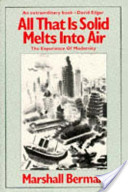All That Is Solid Melts into Air
 | |
| Author | Marshall Berman |
|---|---|
| Country | United States |
| Language | English |
Publication date | 1982 |
| ISBN | 978-0-86091-785-4 |
All That Is Solid Melts into Air: The Experience of Modernity is a book by Marshall Berman written between 1971 and 1981, and published in New York City in 1982. The book examines social and economic modernization and its conflicting relationship with modernism. The title of the book is taken from Samuel Moore's 1888 translation of The Communist Manifesto by Karl Marx and Friedrich Engels.[1][2][a]
Berman uses Johann Wolfgang von Goethe's Faust as a literary interpretation of modernization, through the processes of dreaming, loving and developing. In the second section he uses Marxist texts to analyze the self-destructive nature of modernization. In the third section French poetry (especially Charles Baudelaire) is used as model of modernist writing, followed by a selection of Russian literature (Alexander Pushkin, Fyodor Dostoevsky, Andrei Bely, Nikolai Gogol, and Osip Mandelstam) in the fourth section. The book concludes with some notes on modernism in New York City during the 1960s and 1970s.[3] New York City's subway map is said to have been designed in accordance with Berman's vision of modernity, presented in the book. Berman recalls: "It was a thrill when the man who had designed New York's marvelous Subway Map came up to me on Broadway, and said that all the time he was putting his map together, he had tried to keep my book in mind."[3]
See also[]
- Antimodernism
- Postmodernism
Notes[]
- ^ The original German is: “Alles Ständische und Stehende verdampft”. Sperber translates this more closely as: ‘Everything that firmly exists and all the elements of the society of orders evaporate’. (Sperber, J. (2013). Karl Marx: A Nineteenth-Century Life. USA: Liveright.)
References[]
- ^ Marx and Engels, Collected Works (London, Lawrence & Wishart), vol. 6 (1976), p. 487.
- ^ Marx & Engels (1888). Manifesto of the Communist Party. Translated by Moore, Samuel.
- ^ a b Berman, Marshall. "All That Is Solid Melts Into Air — Afterword 2010" (PDF). Globality Studies Journal. 21: 1.
Further reading[]
- Leonard, John (January 8, 1982), "Books Of The Times (review)", The New York Times[1]
- Seal, Andrew (June 18, 2018), "All that Is Solid… Is Maybe Not So Solid: The Repercussions of a Translation", Society for U.S. Intellectual History
- ^ "Books Of The Times". Retrieved April 13, 2018.
- 1982 non-fiction books
- Books about New York City
- Marxist books
- Modernist literature
- Philosophical literature
- Philosophy book stubs